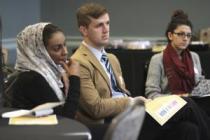UMD "THINKATHON" DISCUSSES ONGOING REFUGEE CRISIS, POSSIBLE SOLUTIONS
By Sydney Tonic, The Diamondback
Photo Courtesy of Victoria Robinson
The arts and humanities college partnered with the Office of Diversity & Inclusion and the Office of International Affairs to foster a discussion about the ongoing refugee crisis in the country and what students at this university can do to help.
Sheri Parks, the director for the Center for Synergy and the associate dean for research and interdisciplinary programming in the arts and humanities college, organized the “Thinkathon,” hoping to implement a “think and do” model to involve students in the discussion.
About 15 students gathered for the workshop Friday morning in Stamp Student Union.
“We believe that, along with faculty and staff, students care about major issues of our time, such as the refugee crisis,” Parks said. “We have students here who have been refugees or are the children of refugees.”
Yasmine Taeb, a legislative representative for human rights and civil liberties at the Friends Committee on National Legislation, spoke about the crisis and its human impact at the event. She said the present crisis is devastating and more than 8 million refugees are internally displaced in Syria.
As part of the committee, Taeb lobbies and advocates about refugee-related issues with congressional offices in the U.S. House of Representatives and the Senate.
“Refugees coming to the U.S. are by far the most scrutinized community of entrance to the U.S.,” Taeb said. “We just don’t feel as though the U.S.’s response to the crisis has been adequate; their response has been quite tepid, at best.”
Hiba Salih, program manager for youth and health at the International Rescue Committee in Baltimore, and Tyler Stoddard, its development coordinator, also came to talk about the work they do for refugees. Salih, a former refugee from Sudan, explained the difficulties of the life of a refugee coming to this country.
“The major challenges are the trauma that they have been through,” Salih said. “Having to adapt to a new country, new systems … they haven’t seen civilization.”
Read more here.





